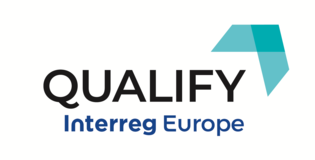QUALIFY 2nd meeting in Poitiers (France)
The partner hosting this second session was the Chamber of Agriculture of the department of Vienne (Nouvelle-Aquitaine). The event was held in the region's capital, Poitiers.
The QUALIFY project, which is part of the Interreg Europe programme and focuses on improving the competitiveness of agrifood SMEs, began in August 2019 and will continue for three and a half years. During this period, the partners from institutions in several European countries will meet on a six-monthly basis to share their experiences and the results of coordinated studies.
The first meeting of the partners took place in Barcelona in early October at the offices of the Ministry of Agriculture, Livestock, Fisheries and Food (DARP) over two consecutive days. The starting points of this project were established, and the initial needs of the agrifood sector were contextualised in order to work on a focused and coordinated basis.
The most recent meeting in Poitiers was attended by representatives of the six partners in the project:
- Subdirectorate-General for Food Inspection and Control (DARP)
- Chambre d’Agriculture of Vienne
- Estonian Chamber of Commerce and Industry
- Bulgarian Chamber of Commerce and Industry
- Slovenian Chamber of Commerce and Industry
- Region of Thessaly.
The first part of the session reviewed of the status of the activities in the first six months, in order to share the conclusions from each activity and to gather ideas for the Action Plan.
The activities were then scheduled for the second six-month period from February to August 2020. During this second period, the activities and research will focus on a specific issue – preventing fraud in the agrifood sector.
The event continued with a speech by Helena Sobiepanek, who is head of organic farming at the Directorate-General for Competition Policy, Consumer Affairs and Fraud Control (DGCCRF) in France. She discussed key issues in preventing agrifood fraud in depth, and considered this challenge primarily in terms of organic products.
She was followed by Boris Labrousse, head of the Label Rouge quality certificate for lamb marketed as Agneau du Poitou-Charentes (PGI), which comes from the former administrative region of Poitou-Charentes. In his speech, he emphasised the importance of developing a quality seal that enables consumers to easily identify the properties and characteristics of the product. The seal must also promote a product that is outstanding in terms of both its organoleptic properties and of other aspects related to higher standards of quality and animal welfare.
The first day ended with a talk by Brigitte Bonet, head of the AANA (Nouvelle-Aquitaine Food Agency), who discussed the promotion of official seals that identify quality and origin. She highlighted the importance of emphasising a product's characteristics using official seals and marks that identify it and provide consumers with guarantees about the reliability of its distinguishing features.
The second day of the meeting between the project partners involved technical visits to two companies with outstanding quality certificates and/or quality standards for their products.
The first was to the Domain Pasquet winery, a family-owned company has been producing cognac and wine for more than 40 years. The Pasquet vineyard, which originally covered 7.5 hectares in the Grande Champagne region, has had an organic farming certificate since 1998. They maintain that they obtain the aromas and tastes of the past that are characteristic of their products thanks to this method.
The second technical visit was to the region of Les Forges, where those attending the meeting were able to enjoy a range of local products, as well as Agneau du Poitou-Charentes. This visit also included a lamb farm which had received the Label Rouge quality certificate. The brand manager, Boris Labrousse, and the owner of the farm, Monsieur Parnaudeau, outlined the difficulties and demands of continuing to work in the primary sector in an increasingly globalised market. Monsieur Parnaudeau provided a comparison of the financial differences involved in producing lamb with and without a quality certificate.



